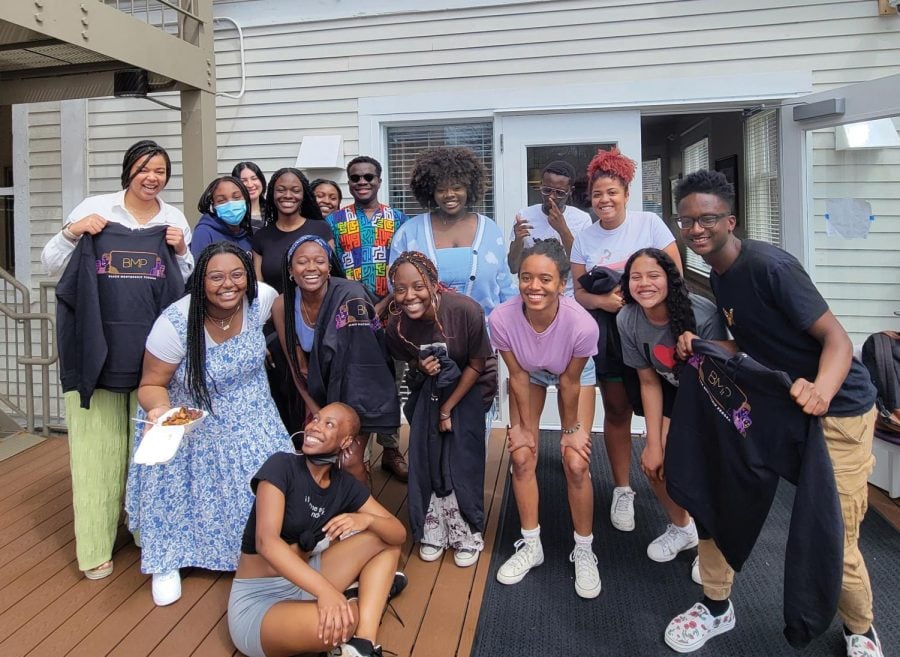Black Mentorship Program provides guidance for Black freshmen
Photo courtesy of Chloe Porter
Members of the Black Mentorship Program show off their merch. The organization seeks to create a welcoming environment for Black freshmen.
October 6, 2022
When McCormick freshman Haneen Awad Awadelsayed was applying to college, she considered if schools had spaces specifically for Black students. Northwestern’s Black Mentorship Program, she said, set the University apart from other institutions.
Now, almost a year after writing about the program in her “Why Northwestern” essay, Awad Awadelsayed will soon be matched with a BMP mentor.
“I thought it was a great opportunity to have a sense of community at Northwestern,” she said.
The Black Mentorship Program, founded by six students in 2018, provides incoming Black freshmen with Black upperclassman mentors.
The program creates a comfortable environment for new Black students, according to Weinberg junior and Executive Coordinator and Administrative Relations Chair Chloe Porter. Porter said the pairings are based on academic interest, hobbies and personality.
“(The founders) really had a goal of welcoming Black students and making sure they felt welcomed and felt supported at the University in order to pursue bigger goals,” Porter said.
Weinberg sophomore and Event Coordinator Keyanna Adams joined the program in freshman year. She said her conversations with her mentor were especially helpful because both of them were on the pre-med track and she helped Adams pick out classes for this year. Adams’ mentor became a good friend, and they spent time together outside of club programming.
Adams added that having a space for Black students builds camaraderie.
“(It’s) a space for them to be their authentic selves,” she said.
Club meetings are intended to be a joyful space for students, Porter said. Besides individual mentorship, the organization also hosts talent shows, quarterly retreats, mental health and wellness workshops, paint nights and group outings.
One of Porter’s favorite memories of last year’s programming was a Family Feud game. It occurred in the middle of the quarter, when students are usually stressed, but she said participants were laughing and screaming out answers while playing at the event.
“We’re not here to cry about our finals,” Porter said. “We’re truly just here to uplift one another.”
The program has grown significantly this year, Porter said. Last year, the club had about 25 mentor-mentee pairs, but that figure is now 45.
Weinberg freshman Corrina Jones said she was pleasantly surprised about how well the group gets along so far, even after only two introductory meetings.
“It was never-ending laughter,” Jones said of her last meeting with the group. “And I got to share it with people who I knew well, who I didn’t know well and people that I’m hoping to get to know.”
The program has benefits beyond connecting with upperclassmen, Weinberg junior and Mentor Developer Sean Dukes said. Making friends in college as a freshman can be nerve-wracking, he said, and the program mitigates this feeling by giving freshmen an already established group of friends.
Dukes, who originally joined the club as a freshman mentee, said he values the connections he’s made throughout his time in the program. He appreciates the chance to have conversations about shared experiences with his fellow club members.
“Talking to Black people who identify with you gives you a safe space,” he said “(It) makes you feel like, ‘This is like home.’”
The club collaborates with other Black affiliation groups, such as the National Society for Black Engineers, and has also attended For Members Only events as a group, Porter said.
Awad Awadelsayed said she’s happy to join a space exclusively for Black students where she knows she can be herself.
“When you’re at a predominately white institution, you have to put on your guard sometimes… and you have to act a certain way to be deemed acceptable,” she said. “It was really nice to get the opportunity to be surrounded by Black students.”
Porter said she wants every Black student to feel welcome at the meetings, regardless of whether they are a mentor, mentee or neither.
The program is designed to be inclusive — every mentee who applies receives a mentor, Porter said.
“That’s what I like,” Porter said, “at the very end of the year when people can reflect, and you’re like, ‘Yeah, we had a great relationship. I love my mentor. I love my mentee. I love my family group.’”
Email: [email protected]
Related stories:
— After pandemic hiatus, Black Formal returns in Homecoming-themed, virtual and in-person events
— For Members Only panelists discuss history, future of black community at NU


